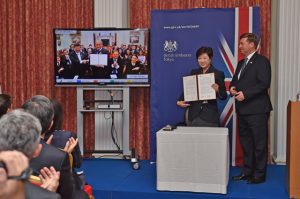
Ogasawara Islands
As well as the central area with its concentration of businesses and global commercial facilities, Tokyo also has also areas rich in nature, including and Tama area to the west of the city centre as well as the 11 Ogasawara Islands which are registered as a World Natural Heritage site, and both the metropolis and these areas see 14 million visitors from overseas annually.
Tokyo is located at the approximate centre of the Japanese archipelago at the centre of all transport networks in the southern part of Kanto, Japan’s most densely urbanised area, which with parts of neighbouring Chubu is also called the ‘capital region’. The region which has up 45% of the country’s population with a total area of 2,187 square kilometres, it is the third smallest local authority area by size in the country, but has the highest population of all local authority areas in Japan.
With the Rugby World Cup this year and the Tokyo Olympic Games the next, more foreign tourists than ever are expected to visit. The Tokyo Metropolitan Government (TMG) has implemented various initiatives to establish Tokyo as an international tourist destination, both practical and strategic, but the city’s policies are not limited to tourism.

Governor Koike signs MoU with Lord Mayor of London
Making Tokyo an international financial city
Tokyo emerged as an international financial city like London and New York in the 1980s and maintains its place as a command centre of the world economy. TMG now promotes various programmes to revitalise the finance sector, hit at the end of the 1990s’ ‘Bubble Era’, while collaborating with other countries and private business, in order to restore its position as a world-renowned international financial city.
TMG provides support needed by financial organisations considering setting up facilities in the city, including a one-stop support service for corporations that provides administrative help and comprehensive consulting services in cooperation with the central government Financial Services Agency, free of charge for foreign companies setting up a base in Tokyo. TMG continuously supports the business community, with the establishment of the Tokyo Open One-Stop Centre, which allows a range of administrative procedures to be conducted in one place.
In December 2017, Tokyo entered into a partnership agreement with the City of London Corporation, the centre of the UK’s financial sector, on the collaboration of future financial events, financial education programmes, green finance and a wide range of other activities.
Financial one-stop support service (link)
Tokyo opening one-stop centre (link)
Raising Tokyo’s international profile
As part of its strategy to raise its international profile and cooperation, Tokyo has become a member of Urban 20 (U20) a new global platform established by the mayors of Buenos Aires and Paris in cooperation with the C40 Cities Climate Leadership Group, made up of 90 of the world’s most influential cities, representing more than 650 million people and one quarter of the global economy and chaired by the Mayor of Paris. As a major urban centre, Tokyo’s role is important to aim for a sustainable and inclusive world based on recognising it plays a significant international role, and also aims to reflect the city’s experiences and opinions from the C40 discussions at the national level within Japan.
Currently, 27 major cities including London (the GLA) are affiliated and Tokyo as 2019 chair held the U20 Tokyo Mayors Summit from May 20-22 this year. At the meeting, a joint communiqué was announced that included planning for achieving zero emissions of greenhouse gases by 2050, which was handed over to Prime Minister Abe Shinzo for the G20 Presidency in Osaka.
Urban 20 details on the TMG website (link)
Tokyo Metropolitan Government continues to work on various urban issues such as the environment, welfare and disaster prevention and hopes to further enhance the attractiveness of the city by promoting these activities on the global stage.

